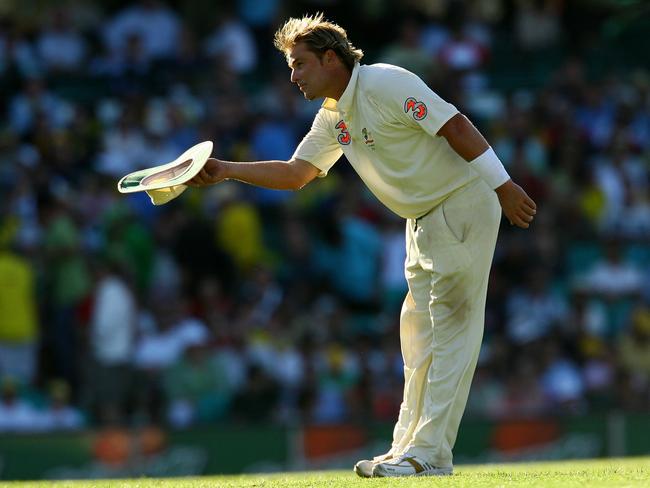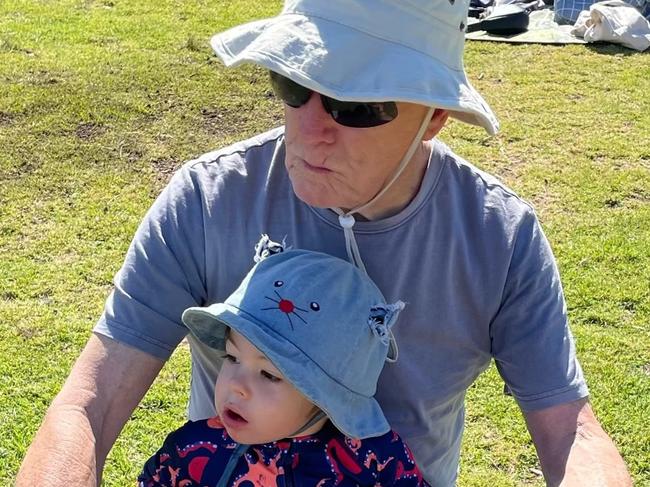Shane Warne Legacy heart tests saving lives in nationwide health drive
The extraordinary impact of health checks organised in Shane Warne’s honour has been revealed, with tens of thousands of heart tests carried out across Australia.
Victoria
Don't miss out on the headlines from Victoria. Followed categories will be added to My News.
Spin king Shane Warne has been credited with giving the gift of life in the wake of his own shock death from a heart attack.
New data reveals the extraordinary impact of nationwide health checks organised in Warne’s honour, with health experts and everyday Aussies declaring lives had almost certainly been saved.
More than 31,742 Shane Warne Legacy heart tests were carried out at Melbourne’s Boxing Day Test and Priceline pharmacies across Australia in December — 7732 by 7601 individuals at the MCG alone.
The results were staggering, with one in three people found to unknowingly have uncontrolled high blood pressure and dozens urged to seek urgent medical attention after recording dangerous readings.
At least 106 people recorded severe blood pressure readings and were advised to consult their GP as soon as possible.
Victor Chang Cardiac Research Institute director and chief executive Jason Kovacic said: “These kind of numbers are really concerning’’.
“At that level it is acutely dangerous so it is important that those people were told the right thing and consulted with a GP,’’ he said.

“At those sorts of levels of blood pressure, the risk of things like heart failure, stroke and those sorts of things go up pretty dramatically.
“So it’s very important that those people got medical attention and those numbers are alarming.’’
Statistics provided by SiSU Health, which provided 23 testing stations around the MCG and 311 Priceline pharmacies across every Australian state and territory, revealed 22 per cent of those checked had high blood pressure.
More than 50 per cent had their blood pressure measured for the first time in at least 12 months.
Participation at the MCG was particularly strong by Warne’s peer age group of 45–54 year olds.
And males represented 57 per cent of those going to chemists for the free tests, bucking traditional trends.
Shane Warne Legacy chief executive Helen Nolan said its partnership with Cricket Australia for the cricket legend’s beloved home Test had “surpassed our expectations’’.
“Since Boxing Day, we’ve expanded to over 311 testing locations across Australia, with more being added regularly,’’ she said.

“Thanks to the support of Novo Nordisk and Latrobe Health, we’re able to offer these tests for free to the public.
“Finding a testing station near you is easy – just visit our website.
“Shane would be so proud his legacy is actually saving lives.’’
The Herald Sun last year revealed formation of Shane Warne Legacy by the sporting great’s family and friends and the heart test challenge as the not for profit’s first quest.
The group set a goal of 23,000 by the end of last year but smashed that target by the third afternoon of the Boxing Day Test.
After queues of people lined up to be tested at the MCG, the group is now looking at rolling out tests at other sporting events such as the Australian Open tennis.
Prof Kovacic said Australia “doesn’t do a particularly good job of blood pressure management’’ and results of the Shane Warne Legacy health checks were “the reality’’.
“I think we really saw the power of Shane Warne through the Boxing Day Test and the whole experience of the Shane Warne Legacy,’’ he said.
“It’s quite amazing what has been achieved and over 7000 heart health checks at the MCG alone is quite amazing.
“Getting Shane’s name behind this has helped achieve what it has achieved.’’
‘I was hanging on by a hair’
Michael Hanley thanks his lucky stars he took a heart health check that almost certainly saved his life.
Having watched Shane Warne Legacy heart tests spruiked during coverage of the Boxing Day Test, cricket fan Mr Hanley knew what to do when he suffered chest pain out of the blue in December.
Otherwise fit and well and used to walking 5km each day at age 74, Mr Hanley thought little would come of the test he took at a Priceline pharmacy in South Morang.
But the results shocked him and set him on a path to lifesaving emergency surgery.
“It said I had the heart of an 81 year old, which sort of staggered me a bit,” he said.
“I did the machine test on the Thursday, went to the doctors and then was in hospital on the Friday afternoon.
“One of my arteries was 98 per cent blocked … one of the doctors said if I hadn’t have done the stress test there was a good chance I wouldn’t be here today.
“I was hanging on by a hair.”

Mr Hanley and his wife Teresa this week sunned themselves at Airlie Beach in tropical Queensland.
Had it not been for an on-screen message telling him to see a GP within 24 hours, things could have been very different.
Teresa said her husband was “super fit” for his age so when the test suggested he contact a doctor, they swung into gear.
“The next day he was seen by our doctor, who sent him straight to the Northern Hospital Epping,” she said.
“Four hours later he had an angiogram followed quickly by a stent being inserted.
“According to the heart doctor he had just been saved from suffering a massive heart attack.
“So … personal awareness plus Shane Warne test plus quick thinking doctor and super staff at the Northern Hospital equals a life saved.”

Like most people, Mr Hanley said he was shocked by Warne’s shock death from a heart attack in Thailand 2022 and had since encouraged family and friends to take the free tests.
“It’s not just me, I’ve spread the word a bit and every one says ‘did that really work?’ and I say ‘well here I am,” he said.
Victor Chang Cardiac Research Institute director Jason Kovacic described Mr Hanley’s experience as “a spectacular save” but said most people could expect a less dramatic but equally important experience from the tests.
“For most people what this does is about checking risk factors and making sure those risk factors are properly controlled,” he said.
“Yes, there will be a handful of remarkable stories that their lives may have been saved but for the great majority it’s about checking risk factors and saving lives in the longer term.
“By controlling blood pressure, glucose and overweight – those things drive cardiovascular disease which is the number one killer in our society.”




